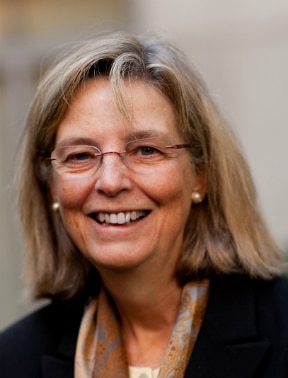Laura Brown did not set off to become a leader in the publishing industry. In fact, her early career aspirations revolved around more artistic pursuits. “I was going to be a painter, but that career path hit an unexpected obstacle: I developed an allergy to paint, which was alarming and sobering.” Unable to pursue her original dream, Brown asked herself, “Well, what do I do now?”
 Following her love of writing and reading, she contacted her friend, Susan Rabiner, a brilliant editor at Oxford University Press, to ask about a career in book publishing. Rabiner said, “Oh my gosh, why do you want to go into publishing? It’s like selling shoes.” She was joking about that, but everything else Rabiner said sounded so interesting, and Brown decided to join OUP USA as a member of the sales and promotion team. She ended up spending more than two decades at the Press, eventually becoming its president.
Following her love of writing and reading, she contacted her friend, Susan Rabiner, a brilliant editor at Oxford University Press, to ask about a career in book publishing. Rabiner said, “Oh my gosh, why do you want to go into publishing? It’s like selling shoes.” She was joking about that, but everything else Rabiner said sounded so interesting, and Brown decided to join OUP USA as a member of the sales and promotion team. She ended up spending more than two decades at the Press, eventually becoming its president.
“It’s almost like being back in school and every season you’re publishing books that are telling you what’s going on in science and what’s going on in politics and what’s going on in philosophy and what’s going on in literature,” she says. “You’re in school for your whole life that way, which is just so satisfying.”
Brown credits her success at Oxford University Press to an early mentor, the president of Oxford USA at the time, Ed Barry, who encouraged her curiosity. “One time we just sat in his office at his big table and we took apart a book from beginning to end. How did we acquire it? How did we edit it? How did we produce it? He actually ripped the spine open to show me what the spine was made of and how the book was put together. It was forensic in a way that was incredible.”
As Brown’s career progressed, she discovered that mentorship can take many forms. “Bill Bowen, who was the founder of JSTOR, I would consider a mentor in terms of how to focus on what’s important and what you really care about, and how to make people feel connected to the mission of what you’re trying to do.”
Brown has also enjoyed the benefits of learning from colleagues at all levels of an organization. “I ended up working in all kinds of areas of JSTOR and I was on the board from 2000, which is very early on for the organization. Kevin [Guthrie] and I have known each other for a long time, and that relationship, I would say, was a different kind of mentoring relationship … It was very, very collaborative, both of us partnering to figure out the future together and exploring new organizational approaches to technology and innovation with staff and industry experts.” She recounts one such example. “A couple of product managers had come to me and to Kevin and said, ‘we think we’re going about this wrong and we think we need to go back to square one and think about what we’re doing,’” and they suggested calling in an expert, Marty Cagan, to help. Kevin and Laura agreed, and assembled a group of JSTOR leaders for a one-day consultation with Cagan, who began the session like this: “‘I’m going to spend the whole day with you and if at the end of this day I haven’t convinced you that you’re doing everything wrong, just don’t pay me. Don’t pay me anything.” That was a different kind of mentoring, but it was also equally satisfying. “So I would say that I feel like the people you work with also mentor you, and it’s not a one way street at all. I have learned so much from some of the people I’ve worked with.”
Curiosity is crucial to meeting challenges, in Brown’s view. “If you’re too invested in what you’ve already built, you’re not really thinking about where your organization could go. So how open you are to thinking about new things, and how open you are to feeling like, Maybe I was on the wrong track, maybe I need to pivot and try something else, or actually look at the problem and try to rethink it. I think that’s really, really important.”
In recent years, Brown has transitioned into a role as a senior advisor for Ithaka S+R, where she remains committed to fostering innovation in higher education, especially social justice initiatives. Her career journey showcases the power of curiosity, resilience, and collaboration as well as the importance of embracing change and learning from leaders and peers alike.